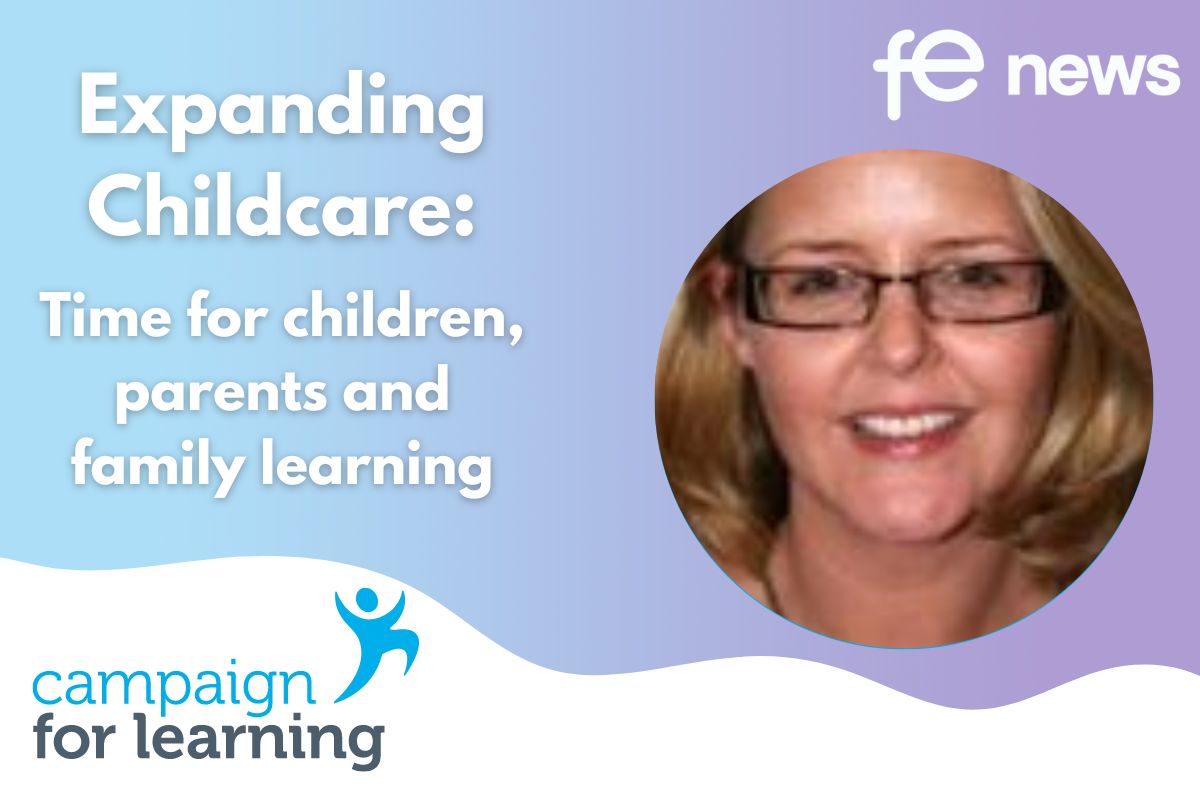Family learning and childcare: lessons from Scotland

Expanding Childcare: Time for children, parents and family learning
Family learning in Scotland is a universal approach that can be utilised in early intervention and prevention programmes. This approach is ideal for reaching the most disadvantaged communities. Done well, family learning helps close the poverty-related attainment gap through breaking the inter-generational cycles of deprivation and low attainment.
Definition of family learning
Scotland’s definition for family learning was developed after extensive consultation with practitioners across sectors. This provides a common language for practitioners who support children and families.
| Family Learning encourages family members to learn together as and within a family, with a focus on intergenerational learning. Family learning activities can also be specifically designed to enable parents to learn how to support their children’s learning. Family learning is a powerful method of engagement and learning which can foster positive attitudes towards life-long learning, promote socio-economic resilience and challenge educational disadvantage. Scottish Family Learning Network, 2016 |
Achieving excellence and equity in education outcomes for learners
A renewed focus was placed on family learning in 2013. This was a direct result of emerging research and policy changes in Scotland. It included the Building the Ambition (2014) strategy, a key document for the Early Learning and Childcare (ELC) sector. The strategy contains family learning as a programme of change which supported the workforce to utilise a family learning approach as a powerful method of engagement and learning for families.
Two years later, the National Improvement Framework (2015) was published and this embedded family learning under the Parental Involvement Act (2006). It brought together parental involvement, parental engagement, family learning and learning at home for the first time.
A Review of Family Learning in Scotland carried out in 2016 resulted in a family learning quality indicator being included in the inspection frameworks HGIOS 4 and HGIOELC. This provided schools and ELC settings with guidance to evaluate the impact of their family learning programmes. Family learning has continued to be included in key policy and strategy documents, such as the Scottish Attainment Challenge (2016-26), Realising the Ambition (2020) and the Adult Learning Strategy (2023).
What is working well in Scotland
The Scottish Government recognise that family learning impacts the whole family, including adult learners. It encourages families to learn together through activities designed to help adults learn how to support their child’s and their own learning. Parents supporting their child’s learning raises attainment and helps close the poverty-related attainment gap.
Our Adult Learning Strategy sets out actions to create more opportunities for family learning. This will be realised through collaboration by increasing professional learning opportunities and supporting the delivery of family learning by sharing practice and resources.
Early learning and childcare links
Realising the Ambition identifies the importance of placing the child at the centre of everything we do. At the heart of this are three key areas: the child as an individual; the child and their environment; and the child and their surrounding culture.
The latter of these highlights the importance of supporting the child, understanding the family and the child’s wider support networks and culture. The national practice guidance explores the key role of family learning in breaking down inter-generational cycles of poverty, through a collaborative learning approach, that is designed and built upon partnership and true parental engagement.
Lessons 1
Ensuring the workforce is developed and equipped to work with families is an ongoing challenge. This is particularly important given that family circumstances and methods of communication can change rapidly through developing technology and other societal and economic influences. Previous research suggests many practitioners do not have appropriate skills, knowledge and confidence to work with parents, particularly those from deprived communities. Research calls for training or continuous professional development (Dyson, 2007).
Lesson 2
Scotland’s policy landscape has changed over time. There is clear evidence of the benefits in having family learning woven across the policy and strategy landscape both nationally and locally. This provides structure and guidance for local authorities, settings, schools, colleges, and community and third sector practitioners who work with families. It has provided a robust and consistent service to children, young people, parents and families across Scotland.
Lesson 3
Research calls for family learning to be ‘built into the core offer… and seen as an effective use of school funding, to ensure that the parents and carers of children, particularly those from disadvantaged backgrounds, are offered high-quality family learning opportunities’ (NIACE, 2013, p11).
In our pursuit of Scotland being the best place for children and young people to grow up, we must acknowledge the immense power that lies within families and recognise its significance in building a prosperous and inclusive nation. Research is key in helping us achieve this ambitious outcome for families in Scotland.
By Susan Doherty, Development Officer – Family Learning, Education Scotland
Campaign for Learning has released a new series of articles, Expanding Childcare: Time for children, parents and family learning.
See below when each article will be published on FE News:
Part One: Childcare the welfare state – 20th July
1. Will Snell, Chief Executive, The Fairness Foundation
Childcare and a new social contract
2. Anneka Dawson, Head of Pre-16 Education, Ceri Williams, Senior Research Fellow, and Alexandra Nancarrow, Research Fellow, Institute for Employment Studies
The childcare sector: Providers and the workforce in England
Part Two: Childcare and time for work – 21st July
3. Paul Bivand, Independent Policy Analyst
Women, employment and childcare
4. James Cockett, Labour Market Economist and Claire McCartney, Policy Adviser, Resourcing and Inclusion, CIPD
The planned childcare entitlements and progression into work
5. Jane van Zyl, Chief Executive, Working Families
Combining flexible working and childcare to solve the childcare crisis
Part Three: Childcare and time for child development – 24th July
6. Janeen Hayat, Director of Collective Action, Fair Education Alliance
Improving childcare quality to support educational outcomes
7. Megan Jarvie, Head of Coram Family and Childcare
Making a step change to child development through childcare
8. Professor Elizabeth Rapa and Professor Louise Dalton, University of Oxford
Childcare, children’s development and education outcomes
Part Four: Childcare and time for parental engagement – 25th July
9. Lee Elliot Major, Professor of Social Mobility, University of Exeter
The childcare revolution: A new opportunity for parental partnerships in child learning
10. Bea Stevenson, Head of Education, Family Links the Centre for Emotional Health
Childcare and parental engagement in child learning
Part Five: Childcare and time for adult skills – 26th July
11. Simon Ashworth, Policy Director, AELP
The new childcare entitlements and skills bootcamps
12. Sharon Cousins, Vice Principal, Newham College and National Association for Managers of Student Services Executive
The new childcare entitlements and access to further education
13. Susan Pember, Policy Director, HOLEX
A thriving society means linking the new childcare entitlements to adult learning
Part Six: Childcare and time for family learning –
27th July
14. Sam Freedman, Senior Fellow, Institute for Government
The childcare revolution and family learning
15. Susan Doherty, Development Officer – Family Learning, Education Scotland
Family learning and childcare: Lessons from Scotland
28th July
16. Susannah Chambers, Independent Consultant
Bringing childcare and family learning together
17. Henriett Toth, Parent
Family learning and childcare: A personal experience











Responses